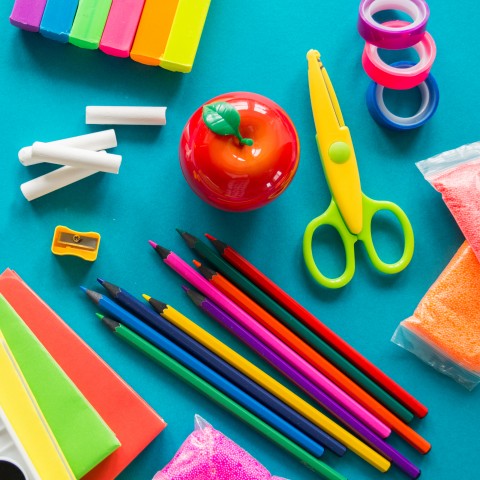
Many people find themselves in Israel for educational reasons, whether it is to learn Hebrew or anything else. Beyond the fact that it’s home to a number of top-ranking universities on a global scale, Israel is a true melting pot of cultures, drawing visitors, including students, from the four corners of the Earth. Not only does Israel boast a robust choice of study abroad programs, many foreigners studying, working, or living in Israel find that teaching their own native language or some other skill they may know is a great way to make a little spending money.
Whatever the case is as far as you’re concerned, you’re likely here because you expect to find yourself in some sort of classroom setting while in Israel. If that’s true, you’re definitely in the right place. In today’s lesson, we’re going to cover the top 30 Hebrew classroom phrases for teachers and students, regardless of whether they are in the context of Hebrew language learning or any other subject. We’ll talk about classroom greetings, teacher’s instructions, how to ask for clarification from the teacher or fellow students, and explaining tardiness or absences. We will also cover subjects of study as well as common school supplies.

Now get your pencils sharpened and your apples polished, and let’s head to class for today’s lesson on useful Hebrew classroom phrases.
 Table of Contents
Table of Contents
- Hebrew Classroom Greetings
- Common Hebrew Teachers’ Instructions
- Asking Teachers and Classmates for Clarification in Hebrew
- Explaining Absences and Tardiness in Hebrew
- Talking about Academic Subjects in Hebrew
- Talking about Common School Supplies in Hebrew
- Let HebrewPod101 School You!
1. Hebrew Classroom Greetings

It’s well known that the classroom is one of the best places to make good friends, whether you are taking a Hebrew Ulpan class or an elective at university in a subject near and dear to your heart. These greetings, largely, are the same as the Hebrew words in general Israeli greetings, which you can read more about here. However, to make this context appropriate, we’ve included some examples where one might be greeting a teacher or classmate specifically. Note that in modern Hebrew, there really is no distinction between these two in terms of formality.
1. בוקר טוב / צהריים טובים / ערב טוב
Boker tov / Tzohorayim tovim / ‘Erev tov
“Good morning / Good afternoon / Good evening”
*This first group of greetings is obviously time specific, so choose accordingly. Note that in modern Hebrew, we would only use לילה טוב (laylah tov, “good night”) as a farewell, not as a greeting. ערב טוב (‘erev tov, “good evening”) can be used as a greeting any time after dark, or after about 5 PM.
- בוקר טוב, המורה. מה שלומך?
Boker tov, ha-moreh/ha-morah. Mah shlomekh?
“Good morning, teacher. How are you?”
- צהריים טובים, רועי. מה נשמע?
Tzohorayim tovim, Ro’i. Mah nishmah?
“Good afternoon, Roi. What’s new”
- ערב טוב, קסניה. עד מחר.
‘Erev tov, Kseniyah. ‘Ad makhar.
“Good evening, Ksenia. Until tomorrow.”
2. שלום
Shalom
“Hello / Goodbye”
*This highly useful Hebrew word can be used for either hello or goodbye. It simply depends on when you use it which defines if it is a greeting or farewell.
- שלום, רוני. מה המצב?
Shalom, Roni. Mah ha-matzav?
“Hello, Roni. What’s up?”
- שלום, המורה שני. טוב לראות אותך.
Shalom, ha-Morah Shani. Tov lirot otakh.
“Hello, Teacher/Miss Shani. Good to see you.”
3. להתראות
Lehitra’ot
“Goodbye” (Literally, “See you.”)
- להתראות, מור. עד השיעור הבא!
- Lehitra’ot, Mor. ‘Ad ha-shi’ur ha-ba!
- “Goodbye, Mor. Until the next class!”
4. נתראה מחר.
Nitra’eh makhar.
“See you tomorrow”
5. המשך יום נעים.
Hemshekh yom na’im.
“Have a pleasant rest of the day.”
2. Common Hebrew Teachers’ Instructions

Now that we’re set greeting teachers and students and bidding them farewell, let’s take a look at another important area of language related to the classroom. Specifically, we’re now going to address the issue of teachers’ instructions. Note that these typically involve basic Hebrew phrases useful in other contexts as well. In the classroom, they may or may not be couched in polite terms, with or without words like “please” or “would you please.” Don’t take the lack of such politeness as intentional rudeness. Remember that Israeli culture is a direct one!
6. בבקשה לפתוח את עמוד … בספרים שלכם.
Bevakashah lifto’akh et ‘amud … ba-sfarim shelakhem.
“Please open to page … in your books.”
- בבקשה לפתוח את עמוד 187 בספרים שלכם.
Bevakashah lifto’akh et amud me’ah shemonim ve-shmoneh ba-sfarim shelakhem.
“Please open to page 187 in your books.”
7. שימו לב.
Simu lev.
“Listen carefully.” (Literally, “Take heart.”)
- שימו לב. הקטע הזה חשוב מאוד.
- Simu lev. Ha-keta’ ha-zeh khashuv me’od.
- “Listen carefully. This part is very important.”
8. שקט בבקשה.
Sheket bevakashah.
“Please be quiet.”
- שקט בבקשה. אני לא מצליח לשמוע את השאלה.
- Sheket bevakashah. Ani lo matzli’akh lishmo’a et ha-she’elah.
- “Please be quiet. I can’t hear the question.”
9. יש שאלות?
Yesh she’elot?
“Any questions?”
- יש שאלות? בכל מקרה תהיה חזרה לפני המבחן.
- Yesh she’elot? Be-khol mikreh, tihiyeh khazarah lifney ha-mivkhan.
- “Any questions? In any case, there will be a review before the exam.”
10. לא לשכוח את שיעורי הבית.
Lo lishko’akh et shi’urei ha-bayit.
“Don’t forget the homework.”
3. Asking Teachers and Classmates for Clarification in Hebrew

Another important category of classroom phrases for your Hebrew vocabulary is those you might use when asking for clarification. You might ask the teacher to repeat or elaborate on something s/he has just shared with the class. Alternatively, you may be asking a fellow classmate to help you understand some point, lesson, or reading you may be struggling with. Or maybe you just need help with the Hebrew! Whatever the case may be, here is some highly useful language to aid you.
11. לא הבנתי.
Lo hevanti.
“I don’t understand.” (Literally, “I didn’t understand,” or, “I haven’t understood.”)
12. תוכל/י לחזור על זה?
Tukhal/Tukhli lakhazor ‘al zeh?
“Can you repeat that?”
13. יש לי שאלה. / יש לי כמה שאלות.
Yesh li she’elah. / Yesh li kamah she’elot.
“I have a question. / I have a few questions.”
14. מה אמר/ה המורה?
Mah amar ha-moreh/amrah ha-morah?
“What did the teacher say?”
15. אפשר לראות את הסיכומים שלך?
Efshar lirot et ha-sikumim shelkha/shelakh?
“Can I see your class notes?”
4. Explaining Absences and Tardiness in Hebrew

Let’s face it. We all show up late to class sometimes. And at times, we may not show up at all! Whether due to traffic, an illness, or a conflicting commitment, it is bound to happen sometimes. And when it does, you’ll want to be well-prepared with some handy language to offer an explanation or justification. You probably don’t want to interrupt the class to do so, however. As in most of the world, comments to explain tardiness are best made to the teacher one on one and after class has ended. And explanations as to an absence – or an expected tardiness, for that matter – are best made before they happen, in an email if necessary.
16. אני לא מרגיש/ה טוב. לא אוכל להגיע לשיעור היום.
Ani lo margish/ah tov. Lo uchal lehagi’a la-shi’ur hayom.
“I’m not feeling well. I won’t be able to attend class today.”
17. סליחה על האיחור. היו פקקים
Slikha ‘al ha-ikhur. Hayu pekakim.
“Sorry I’m late. There was traffic.”
18. לא עשיתי את שיעורי הבית. ברח לי מהראש.
Lo ‘asiti et shi’urei ha-bayit. Barakh li me-ha-rosh.
“I didn’t do the homework. It slipped my mind.”
19. אפשר להשלים את החומר?
Efshar lehashlim et ha-khomer?
“Can I make up the work?”
20. תהיה חזרה לפני המבחן?
Tihiyeh khazarah lifnei ha-mivkhan?
“Will there be a review before the exam?”
5. Talking about Academic Subjects in Hebrew

Now let’s have some useful Hebrew classroom phrases to talk about subjects you like and dislike. To help you refer to the specific subjects relevant to you, we’ve included a list of the most common school subjects. Just be sure to not the grammatical gender of whatever language you use in case you are adding any adjectives, numbers, etc. You can review the issue of grammatical gender in Hebrew here.
| English | Romanization | עברית |
| “math” | matematikah | מתמטיקה |
| “history” | historiyah | היסטוריה |
| “writing” | ketivah | כתיבה |
| “foreign language” | safah zarah | שפה זרה |
| “English” | Anglit | אנגלית |
| “art” | omanut | אמנות |
| “sciences” | mada’im | מדעים |
| “biology” | biyologiyah | ביולוגיה |
| “chemistry” | kimiyah | כימיה |
| “physics” | fizikah | פיזיקה |
| “reading” | keri’ah | קריאה |
| “geography” | ge’ografiyah | גיאוגרפיה |
| “citizenship” (cf. social studies) | ezrakhut | אזרחות |
| Bible | TaNa”KH | תנ”ך |
| physical education | khinukh gufani | חינוך גופני |
| literature | sifrut | ספרות |
21. המקצוע האהוב עליי זה …
Ha-miktzo’a ha-ahuv ‘alai zeh …
“… is my favorite subject.”
- המקצוע האהוב עליי זה תנ”ך.
Ha-miktzo’a ha-ahuv ‘alai zeh TaNa”KH.
“Bible is my favorite subject.”
22. … הוא/היא החוזקה שלי.
… hu/hi ha-khozka sheli
“… is my forte.”
- ספרות זה החוזק שלי.
Sifrut hi ha-khozka sheli.
“Literature is my forte.”
23. אני לא חזק/ה ב…
Ani lo khazak/ah be…
“I’m not too good at…”
- אני לא חזק במתמטיקה.
Ani lo khazak be-matematikah.
“I’m not too good at math.”
24. אני קצת חלש/ה ב…
Ani ketzat khalash/ah be…
“I’m a bit weak in / at …”
- אני קצת חלשה בהיסטוריה.
Ani ktzat khalasha be-historiyah.
“I’m a bit weak at history.”
25. אני מנסה להשתפר ב…
Ani menaseh/menasah lehishtaper be…
“I’m trying to improve in …”
- אני מנסה להשתפר בגיאוגרפיה.
Ani menasah lehishtaper be-ge’ografiyah.
“I’m trying to improve in geography.”
6. Talking about Common School Supplies in Hebrew

Lastly, let’s examine some useful Hebrew phrases for talking about school supplies. Just as in the previous category, we’ve provided a table with a list of common supplies you might find or need in the classroom. Again, be sure to watch the gender of the word or words you use, making sure you conjugate correctly.








